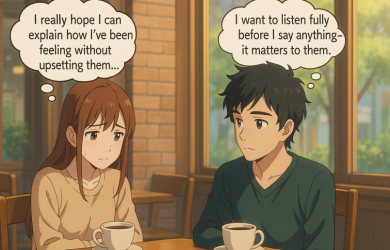15 Ways to Have More Patience in a Relationship

Key Takeaways
Marriage.com AI Quick Summary
When we think about the types of qualities that are essential for a happy and healthy romantic relationship, what comes to mind first?
Love, of course, is followed by attraction, communication, caring, trust, and laughter. What about patience? Patience in a relationship may not be on that list. But long-term couples confirm the beauty of practicing patience in a relationship which is a huge asset to their long-term success.
Patience, respect, and reflectiveness all work together to strengthen the bond that is the base of a nurturing, lasting relationship. Let us explore why patience is important in a relationship.
What is patience?
Patience is the ability to wait calmly, to move forward softly towards a goal, to work towards something unhurriedly. Many of us have never thought about the positive benefits of practicing patience in love.
Is patience good in a relationship?
Undeniably yes!
Dionne Eleanor, transformational mentor & therapist, shares that:
Patience in intimate relationships is the foundation upon which understanding is built.
Slowing down, whether it be to foster deeper connections or just savor the feeling of love, is always a good idea.
Why is patience in dating a good thing? Why is patience important?
Being patient allows for growth. It gives space, breathing room, a place where your communication can flow easily and thoughtfully.
Once you start practicing the art of patience in your relationship, you will be amazed at how this transfers to other areas of your life, making everything that much smoother.
How to have patience in a relationship
If you are thinking, what are some ways to practice patience in your relationship, here are fifteen ways to have more patience in a relationship. These tips will help you to strengthen your relationship with your partner and foster deeper connections with your loved ones.
1. Give your love time to grow
When one does not have patience, it might be impossible to devote the time necessary to grow your connection with your partner.
In our current era of fast food, fast downloads, and, yes, fast-love hookups, thanks to online dating apps, we have lost the art of slowing things down.
In so many aspects of our lives, instant gratification has become the norm. Practicing patience in dating allows you to move carefully and thoughtfully as you learn about each other.
The slow dance of discovery enriches your connection and allows for real love to take root.
As Dionne Eleanor explains:
Every relationship has an ebb & flow of dynamics, some that feel amazing, others that feel challenging and uncomfortable. In the ebb and flow of intimate relationships, patience acts as a beacon of light, guiding partners through moments of uncertainty and perhaps conflict toward the shores of understanding and acceptance.
2. Learning to be patient is good for character-building
Learning to be patient is not only good for romance but is a transferable skill. Once you start to work on patience, you will see how useful it is in the workplace or when interacting with all sorts of people, from cashiers to government officials.
Patience breeds calm, a communicative approach that encourages others to help you rather than shut down. It is the opposite of aggression, which immediately pits your listener against you.
3. Start practicing patience with yourself first
Before you start wondering how to have patience in a relationship, use yourself as a patience-building subject.
If you habitually have zero patience when waiting for, say, the elevator to arrive (you push relentlessly on the button), try this: While you are waiting, practice some deep breathing. Use the mantra “Breathe love in, breathe love out.”
Not only will you feel better once the elevator doors open, but you will also have taken a step toward building your own patience reserves.
4. Listen skillfully
Part of learning to be patient is learning the art of listening. Impatient people are bad listeners; they are so eager for their turn to talk that they neglect to truly tune in to what the other person is saying. There are several techniques that you can use to learn to be a good listener.
For romantic partners, think about active listening, where you mirror back to your partner what you have understood them to say.
5. Practice empathy
Being patient with love requires empathy skills. These are useful life skills to develop for both romantic and non-romantic interactions.
Being empathetic means you are able to see your partner’s perspective, their point of view, even (and especially) if it differs from your own. Not only do you see their perspective, but you also honor it as legitimate and valid for them.
This promotes in your partner a feeling of being loved and understood. So try practicing empathy to deepen your relationship with your loved ones.
6. Carve out time to be together
Many couples have a set date night to make sure they have some time alone together. It is easy with our busy lives to lose track of dedicating time to our beloved, so make couple time a priority.
This will give you space to really slow down and concentrate on being patient with love with each other.
You don’t need to set up a special activity for this time; in fact, it is better to just do something that cultivates your patience while you are together: a walk, slow lovemaking, gardening, or enjoying a good meal with the television turned off.
7. Put away all screens for a set period of time.
Current research is showing that our constant interaction with screens is disrupting certain neural pathways, especially those devoted to developing patience. While waiting patiently for love, try reducing your time on your screens.
Close the computer, turn off your phone, and put away your tablet. Observe the real world around you as you go about your day. Learning to be patient will be helped by getting off your electronic devices and tuning in to the beautiful world we live in.
8. Give up your need to be right all the time
If this is one of your personality traits, you may want to work on the art of compromise as a way to build patience in a relationship. Compromise does not mean you completely neglect your needs or wishes, but rather you and your partner find a way to meet in the middle.
Getting to the compromise will have you enhancing your patience in a relationship, as the process does not happen instantly. The end result may not be precisely what you wanted to see as an outcome, but it will be a combination of your partner’s wishes and yours.
That is a win-win, as it leaves both people feeling valued.
9. Always count to three
Love and patience in a relationship can greatly benefit from this old adage, something our parents may have told us when we were children and on the verge of a tantrum.
If your partner has said something to set you off, maybe brought up a sensitive subject or an old complaint, counting to three before you react is helpful. In those three moments of space, patience and reasoning have time to kick in.
You can take a step back from reacting immediately to your partner and reflect on a productive way to respond. If the issue is a hot topic, and three breaths are not enough to allow patience to flow, try telling your partner you need to step out of the room for a bit before your response.
10. Set realistic expectations
Waiting patiently for love means setting realistic expectations.
If your love expectations are set too high, for example, “My partner needs to be a millionaire, homeowner, ambitious at work but also have ample time to see me,” you are setting yourself up for frustration. This would not encourage patience.
But setting realistic, grounded-in-reality expectations as you are waiting patiently for love allows you to recognize when a person who fits those criteria comes into your life. Your patience will be rewarded.
11. Recognize that your partner is beautifully human, with all that entails.
It is easier to maintain love and patience in a relationship when you recognize the humanity in your partner. Your partner is more than the sum of their parts, a whole being with both flaws and perfections. When you accept that your loved one is human and not a fantasy, practicing patience in a relationship is easier.
12. Benchmark your patience-developing skills.
To see tangible results, set up some realistic goals for you to achieve as you learn the art of patience.
Identify the areas in your life where you are usually impatient: waiting in a traffic jam, waiting for your partner to respond to your text, or standing in line at the bank or the grocery store.
Figure out what you can do to draw on your patience reserves when in any of these situations.
13. Observe the benefits of patience.
When you catch yourself practicing patience, remember to congratulate yourself. Integrate how good being patient feels.
Consciously observing your patience practice is one of the best ways to see how to keep patience at the forefront of your mind.
14. Keep a fit mind and body.
Patience-building skills are easier to learn and retain when your body and mind are functioning at optimal levels.
If you are out of shape, lacking sleep, hungry, or exhausted, patience will be in short supply. It will be more difficult for you to be patient with someone if you yourself are feeling run down.
15. Communicate, communicate, communicate.
Talk to each other about the importance of patience in a relationship. Mindmap ways you both can work on patience.
And don’t forget: if you find yourself short on patience one day, just let your partner know what is going on. “I’m sorry. I’m really unable to be patient right now. Let me eat something/go for a walk/work out first.”
Wrapping up
Now that we know some of the brilliant ways of cultivating patience in a relationship, we can try them out as soon as possible.
Again, practicing patience will need patience!
Don’t expect quick results or expect your relationships to transform magically.
Transformational coach Dionne Eleanor explains that:
Patience is the art of holding space for another and embracing imperfections with compassion, and it takes time to build emotional maturity, stability, and empathy to hold space for such imperfections that are likely less preferable to ourselves.
Keep trying, and if you truly care for your loved ones, you will be able to cultivate patience and transform your life for good in the near future. Good luck!
Also Watch:
 Tips
Tips
Write your tip or submit a video tip
All tips are reviewed before the publishing.
Share this article on
Want to have a happier, healthier marriage?
If you feel disconnected or frustrated about the state of your marriage but want to avoid separation and/or divorce, the marriage.com course meant for married couples is an excellent resource to help you overcome the most challenging aspects of being married.
Recent Articles
Related Quizzes
Unlock Daily 30-Sec Tips for a Happier, Healthier Relationship
👉 Subscribe FREE on YouTube We'd love your feedback!
We'd love your feedback!
 Expert Q&A
Expert Q&A
Ask your question related to this topic & get the support you deserve from experts.





















 Thanks for your feedback!
Thanks for your feedback!